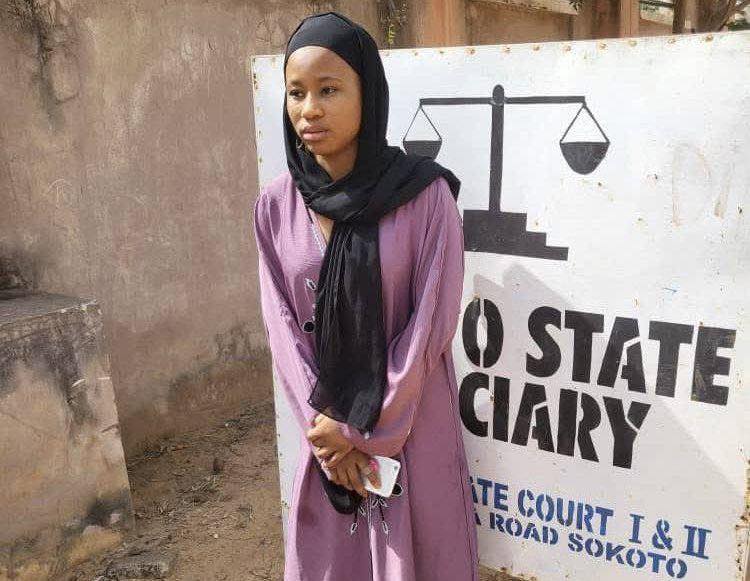Just In: 18-Year-Old Girl Sentenced to 2 Years Imprisonment, 12 Strokes of Cane for Complaining Online About Poverty, Rape, Terrorism, and Banditry in Sokoto State
Sokoto, Nigeria – In a shocking turn of events that has sparked outrage across Nigeria and beyond, an 18-year-old girl has been sentenced to two years imprisonment, alongside 12 strokes of the cane, for allegedly making inciting and defamatory posts on social media that criticized the living conditions in Sokoto State. Her remarks, which highlighted the worsening poverty, rampant sexual violence, widespread insecurity, and persistent banditry in the region, were deemed by a local magistrate court as capable of breaching public peace and promoting disaffection.
The incident, which unfolded quietly until human rights activists raised the alarm, has now ignited a national debate on freedom of speech, the role of the judiciary, and the perceived weaponization of Nigeria’s legal system against vulnerable voices.
YOU MAY READ
Nigerian Hairdresser Sentenced to 5 Years in Ghana for Trafficking Young Women and Forcing Them into Prostitution
The teenage girl, identified only by her first name to protect her privacy, reportedly took to her Facebook page earlier this year to share her frustrations and fears as a young woman living in the heart of Nigeria’s conflict-ridden northwest. In her post, which was widely circulated before it was taken down by authorities, she wrote:
“We sleep in fear every night. Bandits roam freely. Girls are not safe — rape is now a threat we grow up expecting. No job, no help, no justice. Is this the Sokoto our parents grew up in? We are tired.”
While many social media users commended her courage and echoed her sentiments, a few others tagged security operatives and local authorities, accusing her of tarnishing the image of Sokoto and spreading falsehood.
Shortly thereafter, she was arrested by operatives of the Nigeria Police Force in Sokoto and detained for allegedly violating the Cybercrime Act of 2015, as well as breaching the Public Order Act.
YOU MAY READ
Two persons sentenced to d3ath by hanging and surgical castration for r3pe
According to legal documents obtained by this reporter, the girl was charged with:
- Criminal defamation
- Incitement to public disturbance
- Spreading false information online
- Defamation of government institutions
During the trial, which lasted less than three weeks, the prosecution argued that her statements constituted a cyber attack against the image of the state and that such reckless speech was capable of undermining peace and security.
In a ruling that has since drawn condemnation, the magistrate sentenced the teenager to two years in prison with no option of fine, and 12 strokes of cane to be administered publicly in the presence of her parents and community elders.
“She needs to be taught a lesson so that others like her can understand that freedom of speech has limits,” the presiding judge declared.
Following the judgment, human rights organizations including Amnesty International, Enough is Enough Nigeria, and the Nigerian Bar Association’s Human Rights Committee have condemned the ruling.
Amnesty’s West Africa Coordinator, Ousmane Diagana, issued a statement saying:
“This is an appalling miscarriage of justice. An 18-year-old expressing fear and concern about her environment is not a crime — it is a fundamental human right. This ruling is a stain on Nigeria’s commitment to human rights and freedom of expression.”
Social media platforms exploded with outrage, with trending hashtags such as #FreeSokotoGirl, #JusticeForHer, and #EndGagLaw dominating X (formerly Twitter), Facebook, and Instagram.
“This young girl spoke the truth many are too afraid to say. Now she’s in jail while actual terrorists and rapists walk free. Is this justice?”
YOU MAY READ
Enugu High Court Sentences Federal Hospital Directors To Prison For Contempt
“This is not a judgment. It is a message to young Nigerians: ‘Stay silent or suffer.’ We refuse to be intimidated.”
Several legal experts have expressed concern over the trial’s conduct and implications. Constitutional lawyer Dr. Mike Ozekhome (SAN) criticized the judgment as both illegal and immoral.
“There is no provision in Nigerian law that prescribes corporal punishment for expressing dissent or criticism of the government, especially when no incitement to violence can be established. This is a dangerous precedent.”
“It is particularly disturbing that an 18-year-old — barely an adult — is being punished in such a degrading manner for exercising her right to free expression. Nigeria is a signatory to numerous international conventions prohibiting this sort of treatment.”
The underlying issues raised in the girl’s post — poverty, insecurity, sexual violence — are not new to Sokoto or the broader Northwest region. For years, states like Zamfara, Kebbi, and Katsina have battled escalating banditry, mass kidnappings, and attacks on rural communities.
In Sokoto alone, over 700 people were killed by bandits between 2021 and 2023, according to data from Nigeria Security Tracker (NST). Yet, despite repeated military operations and security summits, the crisis appears unrelenting.
Girls and women, particularly in rural and underserved areas, bear the brunt of this instability. According to a 2022 UN Women report, Sokoto has one of the highest rates of child marriage and sexual violence in Nigeria, compounded by limited access to healthcare, education, and justice.
For many in the region, social media has become one of the few outlets for expression, solidarity, and appeal for help. Silencing these voices, critics say, is tantamount to criminalizing survival.
This is not the first time a young Nigerian has faced punishment for online expression. In 2022, a Kano-based TikToker was jailed for insulting a governor. In 2021, a 21-year-old poet in Kaduna was arrested for a poem deemed blasphemous. Numerous journalists and citizens have also faced arrests under the controversial Cybercrime Act, which civil society groups have called on lawmakers to repeal or reform.
Section 24 of the Cybercrime Act, in particular, is often cited in such arrests. While it criminalizes grossly offensive messages, its broad language has been criticized for enabling abuse and curtailing fundamental freedoms.
“Nigeria is becoming a place where it’s more dangerous to speak than to commit actual crimes,” said human rights lawyer, Inibehe Effiong.
Speaking with journalists from the gate of the Sokoto correctional facility, the girl’s mother, visibly distraught, said:
“My daughter did not kill anyone. She did not steal. She only said what is happening. Is it a crime now to talk? We are poor. We don’t have money for big lawyers. We only beg God.”
The father, a retired local farmer, appealed to the state governor and the Chief Justice of Nigeria to intervene and overturn the ruling.
“She is just a child. Her education is now at risk. Please help us.”
Pressure is mounting on President Bola Tinubu to intervene in the case, particularly after his recent pledge to protect press freedom and youth voices. Activists argue that failing to address this abuse of power would send a dangerous message to the world and erode Nigeria’s democratic credibility.
Civil rights groups have called for the immediate and unconditional release of the girl, and a comprehensive review of all similar cases currently in court.
A coalition of youth organizations under the umbrella of #VoicesOfNigeria has also planned a nationwide protest and petition to the National Assembly demanding a repeal of oppressive laws stifling free expression.
As of press time, legal efforts are already underway to appeal the judgment. The girl’s case is expected to be taken up by the Public Interest Law Partnership (PILP), which has vowed to challenge the ruling in a higher court.
According to PILP’s lead attorney, the first motion for bail will be filed in the coming days, followed by a constitutional challenge to the provisions of law used against her.
“We will not allow this injustice to stand. The court must be reminded that its duty is to uphold the Constitution — not suppress it,” said Barrister Emeka Egwu.
This incident, while heartbreaking, is not isolated. It is a microcosm of a broader clash between Nigeria’s evolving digital youth culture and its sometimes archaic legal and political frameworks. It shines a light on the urgent need for reform, empathy, and a recommitment to the values of justice and free speech.
As the girl spends her first days behind bars, millions of Nigerians are asking themselves a question as painful as it is simple: when did telling the truth become a crime?





